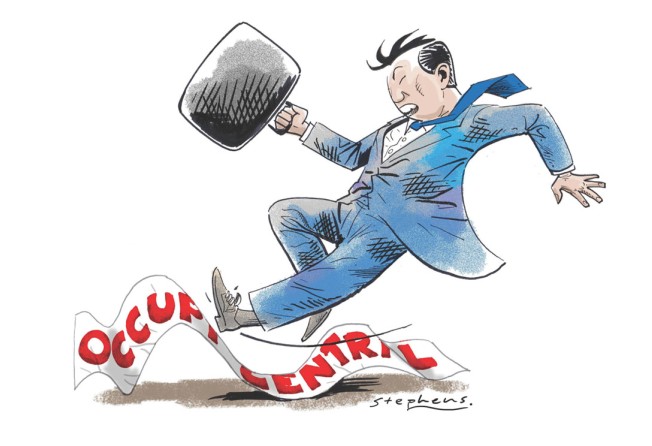Who's responsible for business losses - protesters or the government?
Rick Glofcheski says those contemplating suing protesters for loss of business should realise that such a claim would probably be futile and their energy would be better spent lobbying for a compensation fund

A travel firm is suing Occupy Central co-founder Benny Tai Yiu-ting for business losses suffered during the demonstrations. There may be others contemplating similar claims.
As a matter of legal and social policy, business losses that are not intentionally caused and inflicted on a targeted victim are not protected by civil law. Such losses are expected to lie where they fall. This is part of the give-and-take of living in a free society that follows market principles, in which no one is guaranteed a profit.
This must be so because there are so many factors that contribute to business success or failure. For this reason, it has long been established as a matter of law that there is no relationship of legal duty owed to business enterprises by members of the public, including those carrying out public demonstrations.
By way of example, an airline pilots' strike will surely result in losses to many businesses in the vicinity of the airport. Few would realistically expect that the pilots should be accountable to those businesses for any losses suffered. Industrial strikes are one of many features of a free market economy.
Moreover, where some businesses falter, others thrive in the same conditions. We would not expect McDonald's, Watsons Water and 7-Eleven (not to mention the many unnamed manufacturers of umbrellas) to hand back the windfall they have apparently enjoyed during the recent demonstrations.
There are other problems in any legal action for compensation. Some relate to causation. Who or what can be said to be the cause of such business losses? Let us consider some possibilities.
Is it the heads of the organisations or movements that have been most prominent at the protests? Can any one of them be said to have caused the arrival of people in large numbers to the protest sites? As a matter of common sense, and certainly as a matter of law, the answer is no.
These people went of their own free will. In legal terms, their decision to participate in the protests would be viewed as a new intervening event, a break in any causation that might be attributed to the heads of those social movements.
In fact, all of the thousands of participants would have to be treated as a collective in any attempt to characterise protesters as a cause of the obstructions.
And then there are other possible causes. The decision of the government to close off the original protest site occupied by students at Tim Mei Avenue and the adjacent open spaces caused the large number of arrivals to be forced onto the nearby roads.
This produced serious congestion on Harcourt and Connaught roads. One can surmise that if the public spaces near Tim Mei had not been closed, the nearby streets might not have become the sites of large-scale encampments.
At the moment tear gas was deployed on Harcourt Road on September 28, I witnessed the surge of people towards Queensway, taking some overflow from Harcourt Road, resulting in the obstruction of yet another artery. This suggests that the government may be a cause.
And then there is the police. It is widely believed that the use of tear gas on unarmed protesters caused members of the Hong Kong public to come out in even larger numbers to obstruct the streets.
Like the government, the police department is a very identifiable and lawsuit-worthy entity, certainly more so than an amorphous group of protesters. And, like the government, it is sufficiently resourced to make good on any claims that might be made against it by businesses.
And then there is the central government, which made the decision to immediately terminate group tours to Hong Kong. It can be assumed that this decision caused financial losses to a range of business enterprises. Shall the claimants sue Beijing as well?
The reality is that the success or failure of a business depends on a multiplicity of factors, including, to name but a few, competition, political conditions, the general economic conditions, and management. Many of the major business enterprises in the occupied areas are understood to have had contingency plans in place in anticipation of this very moment and have been operating on an as-usual profit basis.
For these and other reasons, businesses detrimentally affected by the protests would be better advised not to throw away money in pursuit of a futile claim.
Their efforts would be better directed at lobbying the government to consider the establishment of an ad hoc fund for the compensation of small businesses affected by the demonstrations. The establishment of such a fund would be an honourable gesture by the government which, after all, must take some responsibility for the large-scale public discontent that has been expressed so visibly in recent weeks, not to mention some of the poorly judged decisions that it made in its management of the demonstrations.
Rick Glofcheski, editor-in-chief of the Hong Kong Law Journal, teaches tort law at the University of Hong Kong and is the author of Tort Law in Hong Kong